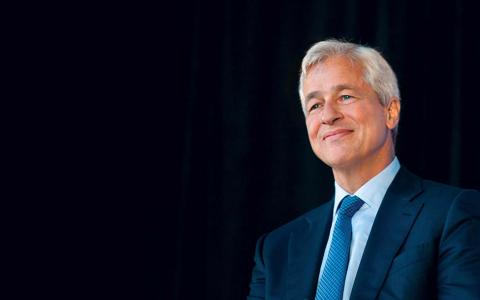
The U.S. was not adequately prepared for the current coronavirus pandemic and needs to address the lack of planning to better prepare for future crises, J.P. Morgan Chase & Co. Chief Executive Jamie Dimon said Monday.
In his annual letter to shareholders, Dimon said he hoped America will “roll up its sleeves” and start to attack its problems, including a costly health-care system, unequal access to education, a litigation and regulatory system that burdens small business, failed immigration policies, and ineffective infrastructure, among shortcomings. The share of wages for the bottom 30% of Americans has been falling, he said, a problem that needs to be acknowledged if it is to be fixed
“There should have been a pandemic playbook,” he wrote. Likewise, he added, every problem he noted “should have detailed and nonpartisan solutions.”
‘While conditions may sometimes be unusual and difficult, we are functioning smoothly. In fact, over the last month in certain parts of our company, we’ve had the highest volume and transaction totals we have ever seen.’
— Jamie Dimon, J.P. Morgan Chase
Dimon, who has recently returned to work after emergency heart surgery in early March, took a detour from the format of his usual annual letter, which typically addresses issues of broad geopolitical importance and public policy along with his views of the bank and its performance, to focus on the crisis and its impact on the global economy and its citizens.
“When the time is right and the future is clearer, I will provide a more complete and current view on how this crisis might change our strategies around how we run the company, work with our clients and governments, and develop public policy solutions,” he said. “However, right now, as we deal with the spiraling effects of this pandemic, I want to focus on what we as a bank can do to remain strong, resilient and well-positioned to support our colleagues, clients, customers and communities across the globe.”
J.P. Morgan is expecting the pandemic to lead to “a bad recession combined with some kind of financial stress similar to the global financial crisis of 2008. Our bank cannot be immune to the effects of this kind of stress,” he wrote.
J.P. Morgan has implemented a series of measures to support its customers, said the letter. It is providing a 90-day grace period for mortgage and car-loan payments, is removing minimum payment requirements on credit cards, and waiving or refunding fees on such things as early withdrawal from CDs, he said.
Customers have drawn down more than $50 billion of revolving credit facilities and the bank approved more than $25 billion of new credit extensions in March alone. The first quarter was also the bank’s biggest ever for investment-grade-bond issuance, said Dimon. The bank has extended new loans to small businesses, and has given $1.9 billion in cash to smaller community banks that are customers.
The bank has stopped buying back its own shares, and the board would consider suspending its dividend in a worst-case scenario, he said.
The bank now has about 180,000 employees working from home but has been able to keep three quarters of its roughly 5,000 branches open. Front-line employees are being given a special payment of up to $1,000, and employees at branches with reduced hours are receiving full-time pay. Workers have been given five additional paid days off to take care of personal needs, including dependent care, child care and other issues.
“While conditions may sometimes be unusual and difficult, we are functioning smoothly. In fact, over the last month in certain parts of our company, we’ve had the highest volume and transaction totals we have ever seen,” said Dimon.
J.P. Morgan’s 2020 earnings “will be down meaningfully” because of the pandemic, he said, but the bank has sufficient capital to get through even the most adverse scenario. That scenario would entail U.S. GDP dropping by 35% in the second quarter and remaining at that level for the rest of the year.
Dimon welcomed the speed with which the U.S. government has put together a stimulus program and said the bank is willing to work with the Trump administration to help get credit to businesses that need it. The bank will not request any regulatory relief for itself, although it would like to see an easing of some rules, he said.
“Some rules can improperly prevent healthy, well-capitalized banks from lending freely in times of stress,” he wrote. “This can hurt customers as the crisis deepens. Leaving high-quality, available liquidity undeployed in times of need is an opportunity forever lost.”
The U.S. needs a plan to get safely back to work, said Dimon, and suggested testing people to certify they have contracted and recovered from the illness, and have the needed antibodies to prevent them from getting sick again or infecting others.
“Initially, we need a buffer period of days or weeks for people to be tested, and then for those who test negative for the virus, we need to discover whether virus antibodies appear through serology testing,” he wrote.
J.P. Morgan Chase shares rose on Monday, as the broader market chalked up significant gains, but are down 36% in 2020, while the Dow Jones Industrial Average has fallen 26%.
This article originally appeared on MarketWatch.



